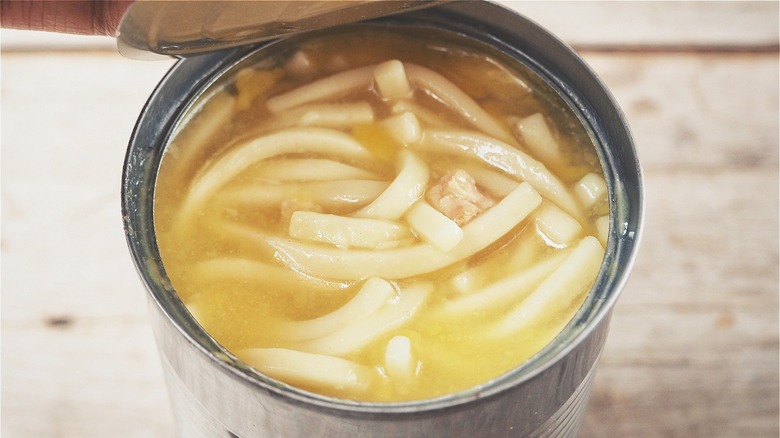The Reason Soggy Noodles Are Not A Problem With Canned Soup
Chicken noodle soup seems made for those cold or rainy sick days when you feel at your worst. At times like this, the last thing you want to do is break open the recipe book for a homemade rendition, so canned soup becomes your meal of choice. But have you ever stopped and wondered why the noodles in your soup haven't turned into mush?
Well, there's actually a scientific reason behind this, and it has everything to do with the types of noodles the manufacturers are using. You see, the reason those noodles in your homemade soup end up a soggy mess is that they're low alkaline. That means once submerged in a liquid and placed in the fridge, the noodles begin to absorb the liquid. If noodles absorb too much water, then they become soft and gummy as a result.
In comparison, manufacturers use tougher and more durable noodles in their soups. These noodles have a high alkaline pH, which means they're less absorbent and unlikely to take on water. In many ways, soup manufacturers have Japanese culture and ramen to thank. These types of noodles, which are typically made of wheat, have been a staple in Asian cuisine. It becomes a bit of a science to find just the right texture for the soup. For instance, adding potassium or sodium carbonate can make the noodles harder or softer. However, there's another overlooked reason the noodles in canned soup don't become soggy.
Don't try this at home
When it comes to ensuring quality control, manufacturers will often cook the noodles separately from the rest of the soup. This allows the manufacturer to reduce how much water the noodles absorb during the cooking process. For a similar reason, if you're cooking chicken noodle soup or some other soup from scratch, you should probably keep the pasta separate. Adding it at the end will prevent your dish from getting soggy.
However, canning enthusiasts are advised against attempting to can their own homemade soup and noodles. If you had the bright idea of cooking chicken noodle soup for a future sick day, then you might want to reconsider. While manufacturers have the machinery and sterilized environment to mass produce canned noodles and soup, pasta and other forms of starch can interfere with homemade canning, which typically requires pressure canning. Likewise, due to the heating required to can soups, your pasta will wind up mushy as a result anyway. Instead, you can go ahead and can your soup broth, but for best results, you should cook your pasta fresh.
Still, if you're in a rush or under the weather, then why not go for a store-bought can of soup? At least now you know why the noodles aren't mushy.

